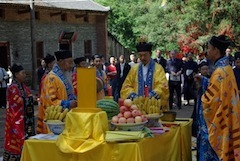|
|
|
|
 |
|
Wildlife and Forests: China
 |
 |
 |
The Daoist abbot of Louguantai leads prayers to bless the Daoist Ecology Temple at its opening in June 2007. |
One of the most significant reasons for the illegal trade in the body parts of endangered animals is their supposed usefulness in Traditional Chinese Medicine. This demand reflects a growth in the use of TCM by the middle classes worldwide and is based on a fundamental misunderstanding of the Daoist principles from which TCM is derived.
ARC's well-established partnership relationship with the Chinese Daoist Association has already allowed both organisations to work with Chinese Government agencies to establish a religious commitment to conservation and environmentalism within China. This partnership is now also being focused on the issues surrounding the misuse of TCM and its impact on endangered plant and animal species.
Daoism and Wildlife Conservation
ARC is working work with the Chinese Daoist Association (CDA), the umbrella organisation for all Daoists in China, which has been our partner for 17 years. Daoism is the philosophical, cultural, religious and physiological basis of TCM, but during the 20th century TCM was mostly separated from its traditional Daoist roots. This project supports the Daoists efforts to change the mindset that underpins the use of endangered species in TCM by attacking the problem at its core and emphasising that the spiritual roots of TCM involves harmony in nature and respect for all living beings.
The Daoist community has a large network of TCM practitioners, producers and consumers, many of whom practice at Daoist temples, and TCM texts are primarily found in the medicinal texts that form one quarter of the 1,440 books of the Daoist Canon. Among Daoism’s basic principles is the importance of maintaining a balance between nature and humanity. The human body is a microcosm of the universe and TCM is essentially about retuning the yin and yang of the body to be in harmony with the yin and yang of the universe. The revolutionary yet spiritually and philosophically consistent teaching of the Daoists is that one’s yin and yang cannot be rebalanced if in trying to do so you disturb the balance of nature and the universe: paradoxically, in fact, such a mistaken approach could well make you more ill.
To advance this message ARC is supporting an awareness campaign with the Daoist Community to reduce the production and market demand for any Traditional Chinese Medicine (TCM) products using threatened animal and plant species and, instead, promote the use of sustainable wild plants and alternatives.
Importantly, ARC’s traditional medicines programme with the Daoist community, and the Chinese Academy of Science, is not just about tackling the illegal wildlife trade but also looks to the restoration of local traditional medicines. This approach will be reviving, through local Daoist temples and networks, the traditions of dong tian and fu di sacred natural and medicinal sites with their sustainable production of herbal medicines, local democracy and concomitant environmental protection in China.
The tradition in China is that each locale has its own versions of core TCM prescriptions based upon locally available resources of primarily flora. Thus while TCM at the commercial level in China is now increasingly a medicine for the middle class, Daoist traditional TCM is the medicine of the poor. The revival of these local dong tian and fu di would enable the Daoists to provide these sustainable medicines at a locally affordable price and thus help reduce the demand for products using illegal wildlife trade items. Tackling the root causes of the illegal wildlife trade by the development and marketing of affordable and sustainable TCM based on local products is a vital part of the wildlife protection strategy.
As a significant step in the campaign Prince Philip, Duke of Edinburgh and founder of ARC, hosted an event at Buckingham Palace in February 2013 at which he met Chinese government officials and Daoist monks and nuns as well as representatives from ARC. The meeting highlighted the Prince's concern about this issue and aims to encourage the Chinese government to support the Daoists in their work.
Further links
Sunday Telegraph article about the Buckingham Palace meeting
What does Daoism teach us about ecology?
Daoist long term plan for the environment
Daoist monks and nuns to manage sacred mountains (2006)
China Taoist Association
Traditional Chinese Medicine & Wildlife
|
 |
|
|
|
|
|

